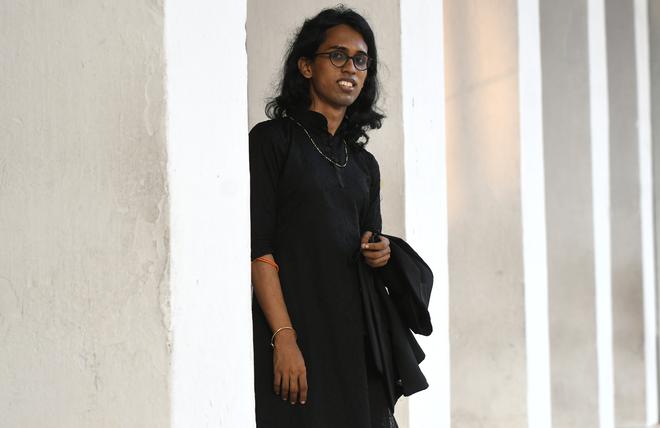PadmaLakshmi Jaya Mohan’s life is a testament to how children fly if their parents support them unwaveringly. Many LGBTQIA+ community members struggle to battle violence within their families. They fight battles around forced marriage, house arrest, the halting of education or work. Not so PadmaLakshmi, whose parents’ names — Jaya and Mohan — stand proudly alongside hers. “My parents are my inspiration. They are the real fighters in my life,” Kerala’s first transgender lawyer tells me. She’s 27 but prefers to think of herself as an always smiling three-year-old because that’s when she officially began her transition.
About 96% of the transgender community are denied jobs in India, the National Human Rights Commission found in 2018. About 92% are deprived of the right to participate in any form of economic activity. A Dalit trans woman recently resigned from the Tamil Nadu police force after harassment from an inspector about her caste and gender traumatised her.
PadmaLakshmi, who recently enrolled with the state bar council and practises in the Kerala courts, has parents who have always believed in her. Jaya, a law clerk, and Mohan, a daily wage welder in Cochin Shipyard, struggled to eke a living but they always prioritised the education of their three children. They didn’t follow any caste or religious practices. PadmaLakshmi frequently refers to them as the “rarest of rare”. “I’m not interested in being a usual person,” she says. “I’ve always wanted to be rare, unusual, uncommon like my parents. I haven’t met a more empathetic person than my father. He feels the pain of others.”
Communication is key
Her success also holds a classic tale of Indian syncretism. Jaya’s employer, an advocate named Abdul Hakim, helped her prepare for the Common Law Admission Test (CLAT). She studied in the pews and on the steps of the Edappally church, a “silent and calm place” near her home in Ernakulam. Her law college professor, Mariamma A.K., was a key mentor.
She says her parents, especially her mother, always knew she was different. “But she didn’t ask me, she gave me time to think,” she says. It was only years later, by which time she had begun to call herself PadmaLakshmi after the model and chef, that her mother finally asked. She saw the glamorous name scribbled in her child’s notebooks and found her Facebook account and, one day, as her youngest was studying for her final law exams, she asked her with a smile: “Are you PadmaLakshmi?” And that was it. “It was very simply handled,” PadmaLakshmi says.

Growing up, if PadmaLakshmi had told her classmates or relatives that she was a woman, they would have thought she was “insane”. Her parents were different. They chose to educate themselves on the internet. They familiarised themselves with gender dysphoria and read about famous trans activists such as Kalki Subramaniam and Lauren Scott.
Her father booked a counsellor and the family went for therapy. “Not for conversion therapy,” says PadmaLakshmi, referring to that dreaded pseudoscientific tactic employed by families in an effort to ‘change’ their child’s sexual orientation. “But to help me communicate and come out.”
PadmaLakshmi says her parents told the doctor that they accepted their child and didn’t care about her gender. They only wanted to see her happy. “The doctor was so surprised,” she recalls. Jaya and Mohan had watched their child struggle with depression and a lack of friends as she graduated with a BSc in physics and tried to figure out what she wanted to be, all the while working assorted jobs such as selling life insurance, giving tuitions and hawking Kerala Public Service Commission bulletins for aspiring candidates to gather money for her hormone therapy.
Showing toxicity its rightful place
PadmaLakshmi says she wants to smile as much as she can (she enjoys cracking silly jokes); people who pretend to be progressive irritate her; she feels hopeful when she talks to college students; and she wants rape and sexual abuse laws to apply equally to trans women. She doesn’t waste any time thinking of ‘negative’ or ‘discriminatory’ people. “I’m not interested in poisonous people. Those who share toxic thoughts on social media are jobless. I don’t have the time to reply to such people.”
She rates herself a “below average student” and has a simple way to combat that failing. “I read and read and read up to 20-25 times and that is my process. Some people say Padma is always ‘byhearting’ things, but I just read so things can imprint on my mind,” she says.
From her parents, she also learned another survival strategy. “I faced a lot of issues from educational institutions and classmates. I’m not interested to repeat or even think of all those negative words. I just put them in the wastebasket and move on,” she says, adding that her parents too got past several crises with this philosophy. At times the family wasn’t able to collect enough money for school fees, but they soldiered on with the help of well wishers and some teachers. Showing toxicity its rightful place is a strategy we could all gain from.
Priya Ramani is a journalist on the editorial board of Article 14. She is the co-founder of India Love Project.







